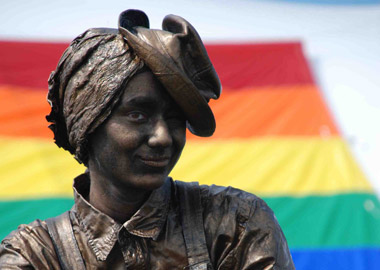Suzanne Seymour recently turned 50, which, she reckons, makes her an “elder” in the LGBT community.
She says this with a laugh. But it’s a role she also takes very seriously. Whatever progress has been made toward equality for gay, bisexual and transgender people—from legal advances to a growing acceptance in pop culture—”elders built the foundation,” says Seymour, the executive director of the LGBT Coalition of Western Mass. “Now it’s my turn as an elder. It’s my turn to do that work. It’s my turn to get the next generation on fire.”
That will be an important focus of the Rainbow Riverfest, the Coalition’s annual fundraiser, to be held this Saturday, Sept. 22, at the Holyoke Canoe Club. The event includes performances by indie singer-songwriter Melissa Ferrick, the electro band Bitch, and singer-songwriter Dani Shay, known from “America’s Got Talent,” “The Glee Project” and YouTube, where her Justin Bieber parody “What the Hell” is approaching six million views. There will also be an after party at Diva’s Nightclub in Northampton, and the night before Riverfest, Northampton’s Academy of Music will screen Wish Me Away, a documentary about country-singer Chely Wright’s decision to come out. Money raised at the festival will go to support the Coalition’s community programs. (For a full schedule and ticket information, go to www.rainbowriverfest.org. More information about the Coalition can be found at www.lgbtcoalitionwma.org.)
But the entertainment isn’t all that Riverfest has going for it, Seymour says; one of the things she finds most exciting is the intergenerational opportunities the event creates. “I’m really behind the idea of young and old looking at one another, seeing one another,” she says. “In our technological world, we have this great way of connecting that we never had before. But that doesn’t replace the human touch. Especially for young people who sometimes feel they can’t make it, seeing other people have made it can be helpful. I know it was for me.”
Studies show that gay and bisexual teens are two to three times more likely to attempt suicide than straight kids (more than one-third of them have attempted suicide, according to one report). Research also shows that they’re more likely to feel unsafe at school, to be bullied, to be victims of physical assaults, even at home. At 2007 report from the National Gay and Lesbian Task Force found that as many as 40 percent of homeless teens were gay, bi or transgender; in many cases, their homelessness was linked to their family’s negative reaction to their coming out.
Seymour understands those risks well. She was a high-school senior, living in a very conservative and religious Catholic household in Vermont, when she was outed. “I was a very innocent girl,” she says. She and her best friend “were very involved in playing our flutes, reading our Bibles, listening to James Taylor.”
The girls’ friendship evolved into an equally innocent romance, which they kept under cover, not even willing to accept the label “lesbian” themselves. But when classmates got hold of some notes the girls passed to each other, the story quickly spread throughout their small town, with the kinds of consequences that are all too common in such stories. “It was certainly the most painful time of my life,” Seymour says. “My only objective was to survive and get out of Dodge, which I did.”
But it was far from easy. “I went through a period of darkness, that’s the best way I can put it,” she says. “You contemplate suicide, you fall into drug use, you fall into alcohol abuse and all the things that go along with that.”
Seymour’s story has a happy ending; today she’s married with children and doing activist work to help kids in the same situation she once found herself. “I remember what it’s like to be young and not to feel safe,” she says. And even today—yes, even in places as seemingly open as the Valley—there are plenty of young people who feel unsafe. “There are still people who are afraid to come out because of religion or their families’ reaction. Or they’re afraid to even come out to themselves because they’ll—quote—’go to hell.'” Rainbow Riverfest, Seymour says, is a time to “celebrate the ability to be free in a safe place” and also to remember the work that still needs to be done.
“That is what I hope the Riverfest becomes—an inspiration to do a little more than click ‘Like’ on your Facebook page,” she says. “First you have to get off the couch. You can’t just be on a computer thinking you’re doing the right thing. Activism requires you to show up, get out there, write a letter to the editor, give money to your local nonprofit, speak up when your friend is saying, ‘I don’t like queers’—that is activism.”
The work that young activists do now will help future generations, just as the work of those before her helped her, Seymour adds. “This is just my time in my life to give back. This is my period to give back, just as someone did for me. I don’t know who they were, but they built a platform for me.”



